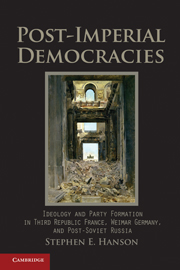 Post-Imperial Democracies
Post-Imperial Democracies Book contents
- Frontmatter
- Contents
- Acknowledgments
- Preface
- Post-Imperial Democracies
- PART ONE CONCEPTUAL AND THEORETICAL ISSUES
- PART TWO CASE STUDIES
- 4 The Founding of the French Third Republic
- 5 The Rise and Fall of the Weimar Republic
- 6 Post-Soviet Russia
- 7 Conclusion: Bringing Ideology Back In
- Index
- Cambridge Studies in Comparative Politics
- References
6 - Post-Soviet Russia
Published online by Cambridge University Press: 05 June 2012
- Frontmatter
- Contents
- Acknowledgments
- Preface
- Post-Imperial Democracies
- PART ONE CONCEPTUAL AND THEORETICAL ISSUES
- PART TWO CASE STUDIES
- 4 The Founding of the French Third Republic
- 5 The Rise and Fall of the Weimar Republic
- 6 Post-Soviet Russia
- 7 Conclusion: Bringing Ideology Back In
- Index
- Cambridge Studies in Comparative Politics
- References
Summary
In examining the sixteen years from the formal establishment of the Russian Federation in 1992 through the election of Dmitrii Medvedev as the presidential successor to Vladimir Putin in early 2008, we obviously cannot yet rely on the sort of comprehensive, detailed historiography of the period that exists for the early French Third Republic or Weimar Germany. Fortunately, where a few historians are now just beginning to tread, a whole team of intrepid political scientists – both in Russia and the West – has over these years collectively generated a remarkably detailed account of the rise and fall of post-Soviet democracy. Indeed, our documentation of the formative years of the Russian Federation, at the levels of both elite politics and mass public opinion, is among the best that exists for any newly democratizing regime. We owe a great debt to those scholars who braved substantial professional and popular disinterest in postcommunist Russian studies, often working in challenging conditions, to obtain and analyze these data.
Despite the abundance of empirical evidence, however, how to account for Russia's political trajectory – from the collapse of the Soviet Union, through Russia's troubled experiment with representative rule in the 1990s, to its increasing authoritarianism of the early twenty-first century – remains theoretically contentious. Taken as a whole, these developments appear to have confounded the expectations of nearly all early analysts of Russian politics.
- Type
- Chapter
- Information
- Post-Imperial DemocraciesIdeology and Party Formation in Third Republic France, Weimar Germany, and Post-Soviet Russia, pp. 175 - 236Publisher: Cambridge University PressPrint publication year: 2010
References
- 1
- Cited by
